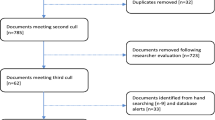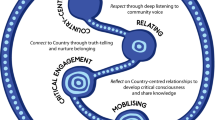Abstract
Teach For America (TFA), a widespread and well-known route into the teaching profession, frequently partners with university-based education programs to prepare and certify its corps members. However, university-based teacher education programs frequently emphasize very different understandings of socially just education and priorities for training teachers from those of TFA. Accordingly, science teachers trained through TFA-university partnerships encounter conflicting understandings of science education, justice, and urban communities as they are introduced to teaching practice. In this ethnographic case study we explored the experiences and reactions of a cohort of TFA corps members in a science methods course as they engaged with TFA’s perspective focused primarily on enhancing students’ social mobility and the methods course emphasizing democratic equality through scientific engagement. The study considers intersections between TFA’s approach to teacher preparation and sociocultural perspectives on equitable science teaching. The study also lends insight into the contradictions and challenges through which TFA science teachers develop understandings about their role as science teachers, purposes and goals of science education, and identities of the students and communities they serve.

Similar content being viewed by others
References
Anderson, A. (2013). Teach For America and the dangers of deficit thinking. Critical Education, 4(11), 28–46.
Bazzul, J. (2012). Neoliberal ideology, global capitalism, and science education: Engaging the question of subjectivity. Cultural Studies of Science Education, 7, 1001–1020. doi:10.1007/s11422-012-9413-3.
Berliner, D. C. (2009). Poverty and potential: Out-of-school factors and school success. Retrieved from http://files.eric.ed.gov/fulltext/ED507359.pdf.
Bryan, L. A., & Atwater, M. M. (2002). Teacher beliefs and cultural models: A challenge for science teacher preparation programs. Science Education, 86, 821–839. doi:10.1002/sce.10043.
Cochran-Smith, M. (2003). The multiple meanings of multicultural teacher education: A conceptual framework. Teacher Education Quarterly, 30(2), 7–26.
Crawford-Garrett, K. (2013). Teach For America and the struggle for urban school reform. New York, NY: Peter Lang.
Donaldson, M. L., & Johnson, S. M. (2011). Teach for America teachers: How long do they teach? Why do they leave? Phi Delta Kappan, 93(2), 47–51.
Elmesky, R. (2005). Playin on the streets-solidarity in the classroom: Weak cultural boundaries and the implications for urban science education. In K. Tobin, R. Elmesky, & G. Seiler (Eds.), Improving urban science education: New roles for teachers, students and researchers (pp. 90–111). New York: Rowman & Littlefield Publishers Incorporated.
Emdin, C. (2011). Dimensions of communication in urban science education: Interactions and transactions. Science Education, 95(1), 1–20. doi:10.1002/sce.20411.
Farr, S. (2010). Teaching as leadership: The highly effective teacher’s guide to closing the achievement gap. New Jersey: Wiley.
Flyvbjerg, B. (2001). Making social science matter: Why social inquiry fails and how it can succeed again (S. Sampson, Trans.). Cambridge: Cambridge University Press.
Fradd, S. H., & Lee, O. (1999). Teachers’ roles in promoting science inquiry with students from diverse language backgrounds. Educational Researcher, 25(4), 479–501. doi:10.2307/1177292.
Gutmann, L. (2013). The outsized effects of equating teaching with leadership: Implications of Teach For America’s vision for engaging teachers in reform. Critical Education, 4(13), 45–68.
Heilig, J. V., & Jez, S. J. (2010). Teach for America: A Review of the Evidence. Retrieved from http://0-search.ebscohost.com.libus.csd.mu.edu/login.aspx?direct=true&db=eric&AN=ED510247&site=eds-live.
Kretchmar, K., Sondel, B., & Ferrare, J. J. (2014). Mapping the terrain: Teach For America, charter school reform, and corporate sponsorship. Journal of Education Policy, 29, 742–759. doi:10.1080/02680939.2014.880812.
Labaree, D. F. (1997). How to succeed in school without really learning: The credentials race in American education. New Haven, CT: Yale University Press.
Labaree, D. (2010). Teach For America and teacher ed: Heads they win, tails we lose. Journal of Teacher Education, 61, 48–55. doi:10.2307/369991.
Lahann, R., & Reagan, E. M. (2011). Teach For America and the politics of progressive neoliberalism. Teacher Education Quarterly, 38, 7–27.
McLaughlin, C. A. (2014). Urban science education: Examining current issues through a historical lens. Cultural Studies of Science Education, 9, 885–923. doi:10.1007/s11422-014-9598-8.
NGSS Lead States. (2013). Next generation science standards: For states by states - three dimensional learning. Retrieved from http://www.nextgenscience.org/three-dimensions.
Roth, W.-M., & Barton, A. C. (2004). Rethinking scientific literacy. New York: Taylor and Francis Books Inc.
Roth, W.-M., & Lee, S. (2002). Scientific literacy as collective praxis. Public Understanding of Science, 11(1), 33–56. doi:10.1088/0963-6625/11/1/302.
Smith, A. (2005). Equity within reach: Insights from the front lines of America’s achievement gap. Results from a Survey of Teach For America Corps Members. Teach For America. New York. Retrieved from http://files.eric.ed.gov/fulltext/ED495156.pdf.
Strauss, A., & Corbin, J. (1998). Basics of qualitative research: Procedures and techniques for developing grounded theory (2nd ed.). Thousand Oaks, CA: Sage.
Tan, E., Barton, A. C., Turner, E., & Gutiérrez, M. V. (2012). Empowering science and mathematics education in urban schools. Chicago: University of Chicago Press.
Tobin, K. (2005). Urban science as culturally and socially adaptive practice. In K. Tobin, R. Elmesky, & G. Seiler (Eds.), Improving urban science education: New roles for teachers, students and researchers (pp. 21–42). New York: Rowman & Littlefield Publishers Incorporated.
Tobin, K. (2011). Global reproduction and transformation of science education. Cultural Studies of Science Education, 6, 127–142. doi:10.1007/s11422-010-9232-3.
Tobin, K., Elmesky, R., & Seiler, G. (Eds.). (2005). Improving urban science education: New roles for teachers, students and researchers. Lanham, MD: Rowman & Littlefield Publishers Inc.
Tyack, D. B. (1974). The one best system: A history of American urban education. Cambridge: Harvard University Press.
Veltri, B. T. (2010). Learning on other people’s kids: Becoming a Teach For America teacher. North Carolina: Information Age Publishing.
Author information
Authors and Affiliations
Corresponding author
Additional information
Lead Editor: S. Martin.
Rights and permissions
About this article
Cite this article
McNew-Birren, J., Hildebrand, T. & Belknap, G. Strange bedfellows in science teacher preparation: conflicting perspectives on social justice presented in a Teach For America—university partnership. Cult Stud of Sci Educ 13, 437–462 (2018). https://doi.org/10.1007/s11422-016-9791-z
Received:
Accepted:
Published:
Issue Date:
DOI: https://doi.org/10.1007/s11422-016-9791-z




